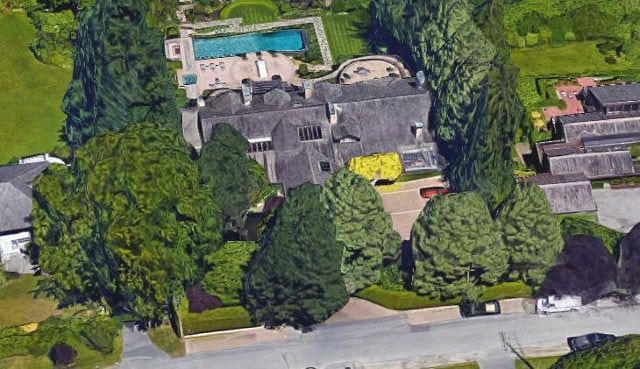
An aerial view of a $23.5 million Vancouver mansion recently purchased by a Chinese student
Canadian authorities have slapped a tax of up to 20 percent on overseas buyers purchasing homes in Greater Vancouver. The move by the British Columbia authorities comes amidst growing public outcry over runaway housing prices perceived to be fuelled largely by non-resident Asian buyers.
The new measure, which echoes similar moves in Hong Kong and Singapore after mainland buyers jumped into those markets, is said by some experts and industry professionals to not go far enough to quell the growth of overseas money flowing into the western Canada city.
Tax Takes Aim at Foreign Speculators
British Columbia announced the new property tax on Monday and said it is set to go into effect starting August 2nd. The province’s Finance Minister Mike de Jong stated that the new levy will vary between 10 and 20 percent depending on market conditions. An earlier press release indicated the tax will apply to “foreign nationals or foreign-controlled corporations,” although permanent residents of Canada regardless of nationality are exempt.
This means for a buyer who isn’t a Canadian citizen or permanent resident, a home costing C$2 million may face a tax bill of up to C$300,000, while the purchase of a C$10 million home in Vancouver could see a potential C$1.5 million in taxes. The average price of a detached home in greater Vancouver now stands at C$1.8 million and the price for a typical home rose 32.1 percent in the year to June to C$917,800 according to the Real Estate Board of Greater Vancouver.
Recent government data also revealed that in the period between June 10th and July 14th, foreign nationals invested over C$1 billion into British Columbia property, with more than 86 percent of it directed at the Lower Mainland, the area encompassing the city of Vancouver and the surrounding region. The research showed that out of the 6.5 percent of sales made to foreigners, over 90 percent of them were Chinese.
China has long been the subject of scrutiny in Vancouver as many locals criticized mainland investors of laundering money in the city’s real estate market, such as the C$31 million ($23.5 million) mansion purchased by a Chinese student earlier this year. The role of Chinese investors also caused an uproar in April this year, when local property agent Julia Lau flipped a pair of run-down Vancouver apartment buildings valued at just C$17M (USD $13.5M) to a pack of mainland-backed investors for C$60 (USD $47.5), after crowd-funding the original purchase.
Government Champions Affordability in High-Priced Market
British Columbia’s Premier Christy Clark defended the surprise move, stating “owning a home should be accessible to middle-class families, and those who are in a position to rent should be able to find a suitable home.”

Earlier this year, former real estate agent Julia Lau (centre) crowdfunded a controversial flip of a Vancouver property
Studies including peer-to-peer reviews indicated the constrained affordability from the decoupling of house prices and local incomes has been exacerbated by millionaire migrants, many from China, arriving in Vancouver and numbering over 60,000 since 2002.
However, some have criticized the plan for targeting residency rather than the source of income, providing a loophole for overseas buyers to purchase Vancouver property through resident family members or other locals.
Professor at the University of British Columbia Thomas Davidoff stated, “I do think we are going to see fewer foreign buyers … the question is whether that foreign money will continue to find its way into the Vancouver housing market anyway, through related parties. If your cousin is a permanent resident or citizen, then of course you’ll buy through them.”
Assistant professor at Simon Fraser University Josh Gordon shared this sentiment, saying it is common practice for overseas money to flow into Vancouver real estate through Canadian permanent residents as proxy buyers, such as a child attending a Canadian university, thereby avoiding such tax altogether.
Although lauding the efforts as a significant move, Davidoff added he would have preferred a tax break for homebuyers who could prove their income was earned locally rather than abroad.
The new tax is similar to other schemes in Hong Kong, Australia and Singapore designed to curtail rapid house price growth. Hong Kong implemented its own 15 percent tax on residential property purchases by non-permanent-residents and corporations in 2012 to hamper high prices fueled by mainland Chinese.
Australia also imposed its own regulatory restrictions and tighter lending policies on foreign buyers, and Canadian Imperial Bank of Commerce (CIBC) economist Benjamin Tal states there are some early signs of success as the share of foreign nationals in demand for new housing has fallen.
Leave a Reply